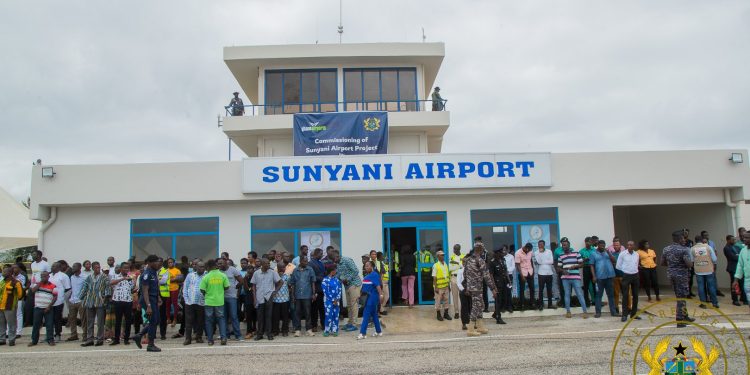In spite of continuous efforts to enhance airport infrastructure in the country, it has emerged that the outcomes have been underwhelming, with the five regional airports yielding less returns than anticipated.
Data sourced from the latest Auditor General’s Report on the accounts of public boards, corporations and other statutory institutions in 2023 showed that in 2022, the airports generated a combined revenue of GH¢13.13 million from their operations as against an expenditure of GH¢39.14 million.
The deficit of GH¢26.01 million has prompted a re-evaluation of strategies to optimise regional airport development and maximise economic benefits.
The regional airports are the Kumasi Airport, now Prempeh I International Airport in the Ashanti Region, the Tamale Airport in the Northern Region, the Wa Airport in the Upper West Region, the Sunyani Airport in the Bono Region and the Ho Airport in the Volta Region.
A further breakdown of the data indicated that the Kumasi Airport injected GH¢15.68 million as expenditure but generated GH¢8.22 million in revenue. Tamale Airport on the other hand raked in GH¢4.74 million in revenue but invested a huge sum of GH¢15.41 million as expenditure, while Sunyani Airport accrued GH¢95,626.58 in revenue after an expenditure of GH¢4.53 million.
Surprisingly, the Ho Airport, which generated no revenue, had an expenditure of GH¢1.38 million in its books in 2022, while the Wa Airport generated GH¢77,250.48 as revenue and invested GH¢2.15 million in its operations.
Not commercially viable
The Auditor-General, Johnson Akuamoah Asiedu, in the 2023 Auditor- General’s Report on the account of public boards, corporations and other statutory institutions sighted by the Daily Graphic, stated that the unimpressive performance by the regional airports was attributable to low passenger patronage, few domestic airlines currently in operation, and the underutilisation of airport rentable facilities or space for non-aeronautical revenue.
“Section 7 of the Public Financial Management Act, 2016 (Act 921) states that a Principal Spending Officer shall, in the exercise of duties under this Act, establish an effective system of risk management, internal control and internal audit in respect of the resources and transactions of a covered entity.
“We conducted an analysis on the operations of five regional airports in terms of their commercial viability and noted that all five regional airports were not commercially viable,” the report stated.
It said the current trend affected the Ghana Airports Company Limited’s (GACL’s) finances considering low revenue generated compared with a high operational cost of running those regional airports.
The report warned that the underutilised airport facilities as in the case of Ho Regional Airport could result in the deterioration of the facility.
AG’s recommendation
The Auditor-General, therefore, recommended that GACL Management should encourage existing and potential domestic airlines to patronise the airports by providing possible incentives to them.
“We also recommended that Management should embark on a publicity drive to promote and market these airports to encourage more air travellers to patronise these Regional Airports.
“Furthermore, the Commercial Service Department of the GACL should identify potential concessionaires to occupy idle spaces to generate more revenue through rent and royalties,” the report said.
It added that GACL management should liaise with appropriate regulatory authorities to reduce regulatory barriers for potential airlines without necessarily compromising safety.
GACL’s response
The report also captured the response of the management of the airports who admitted that none of the regional airports were commercially viable.
However, the GACL said it was envisaging that with the new infrastructure and the commencement of the international operations, some of the airports in the regions could become viable.
“GACL is also responsible for the provision of related social and public services in all the regions of the country from its own resources. The company is required to invest immensely in all the regional airports in Kumasi, Tamale, Sunyani, Wa airstrip and the new airport at Ho,” the report captured as GACL’s response to a specific question.
“These regional airports are not revenue generating and cannot fund the required development projects which are needed to keep them operational,” the report said. “It must be emphasised that the creation of these non-commercially viable regional airports is a national policy. Airport infrastructure is highly capital intensive and can only be done through retained earnings.
“Developing the infrastructure at the regional airports would create massive job opportunities during and after construction,” the report further stated as the response from GACL.
GACL deserves support
Management of the facilities, however, stressed that in view of the social and economic benefits of domestic aviation, GACL deserved government’s support to enable the company to expand and become competitive.
That, the management said, would also ultimately achieve the objective of providing access for emergencies through air transport in all the regions to make Ghana an aviation hub in the Economic Community of West African States (ECOWAS) sub-region.










Discussion about this post